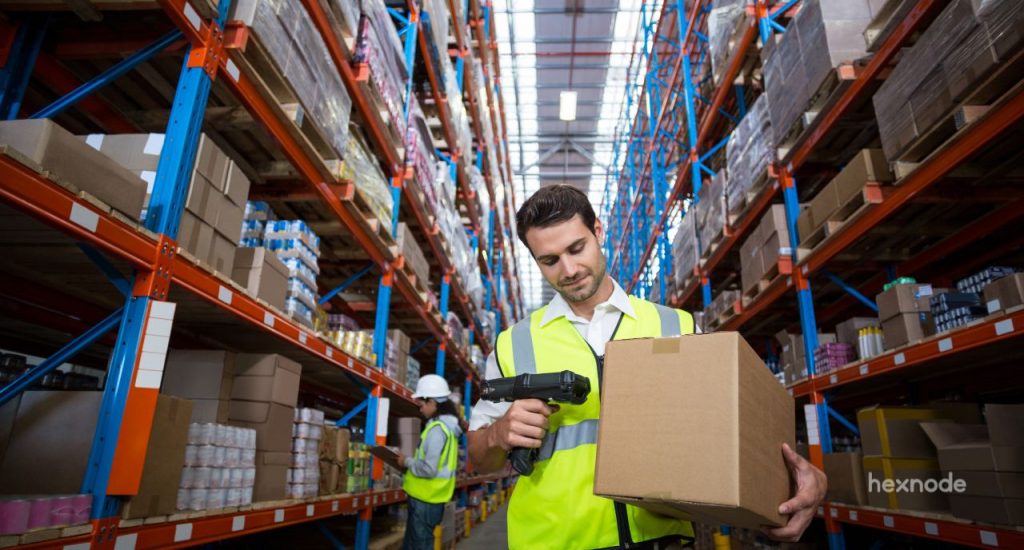Rugged tablet or rugged laptop: Which one delivers a better ROI?
Check out who makes a better buzz in ROI, rugged laptop or rugged tablets.

Get fresh insights, pro tips, and thought starters–only the best of posts for you.
Alie Ashryver
Jan 25, 2023
10 min read

Primenesia: Noun/ Prime-ne-sia
When you order so much through Amazon Prime that you have no idea what is in the package that you just signed off on with the delivery boy
– Urban Dictionary
Well, we’ve all had our experiences with online shopping. Maybe not to the point of primenesia, but enough to get riled up if the packaging is mangled or jump around in excitement when the package comes in earlier than expected. Yup! We’ve all been there. So, we all know how much we depend on the delivery system to get our goods delivered to us safe and sound. Well, this delivery system is part of a large and dynamic industry called transport and logistics. And that is something we grew up learning.
So why this blog, you ask? Don’t worry! All in good time. So, we know about the transport and logistics industry and I’m guessing you’ve heard about the buzz the rugged devices are making in the market. And so, tying the two threads together, today, we will see how rugged devices affect the transport and logistics industry. Hold on tight as we take a trip into the exciting world of moving goods from one place to another, buckled up with rugged devices.
Assumptions are the worst enemies that any conversation could have. They leave you biased and also get in the way of putting everything out there as you think the other party already knows whatever it is you are omitting. So, before diving off the deep end into the importance of rugged devices in the transport and logistics industry, let’s break down the individual terms involved.
The transport and logistics industry is like a complex puzzle with many pieces. These pieces must fit together seamlessly for goods and materials to be transported from point A to point B efficiently and effectively.
Imagine a truck as the main piece of the puzzle. Driving along a highway, the truck stops at various warehouses and distribution centers to pick up and drop off packages. This truck is just one small part of the bigger picture, however. Behind the scenes, there are many other pieces working together to make sure that the truck has a safe and efficient route, and that the packages are systematically tracked and accounted for.
For example, there are logistics managers who plan out the most efficient routes for the truck to take and use software to track and monitor its progress. Then there are the customs agents who ensure that all necessary documents and clearances are accounted for when the truck crosses international borders. Then again, the warehouse workers carefully loading and unloading the packages onto the truck, using specialized equipment such as forklifts and conveyor belts.
All of these pieces must work together in tandem for the transport and logistics industry to function smoothly. It’s a never-ending puzzle, with new pieces constantly being added and rearranged, but the end goal is always the same: to get the packages where they need to go, on time, and in good condition.
Rugged devices are like superheroes in the tech world. They are tough and durable and can withstand harsh conditions and rough treatment. They’re built to be used in extreme environments where regular devices would quickly break or malfunction. They’re designed for outdoor enthusiasts, industrial workers, and first responders who need reliable technology that can withstand dust, water, drops, and extreme temperatures. These devices are like the Clark Kent of technology, able to transform into powerful tools that can handle any situation. They may not have a cape, but they’re always ready for action.

Rugged devices have made mobility possible in a lot of industries. However, these devices need efficient management methods to safeguard sensitive data. Check out the benefits of rugged devices and learn how you can secure them with Hexnode.
Download whitepaperIn the transport and logistics industry, time is money, and every second counts. That’s why having reliable and durable equipment is essential for the success of any logistics operation. Rugged devices can provide a reliable and durable means of tracking, monitoring, and communicating critical information in some of the harshest environments imaginable. Due to their sturdy build, rugged devices are perfect for the transport and logistics industry. They can resist shocks, vibration, dust, water, and extreme temperatures. And so, they can function properly even in the most demanding conditions.
Take, for instance, a logistics company that uses rugged tablets to track and manage inventory in a warehouse. The personnel subject these tablets to constant movement and handling, as well as exposure to dust and dirt. Without rugged devices, the tablets would likely break or malfunction quickly, leading to delays and lost productivity. But with rugged tablets, the company can rely on the devices to function properly and keep operations running smoothly.
Let’s try another angle. Imagine a delivery partner navigating through a snowstorm. He/she uses a consumer-grade device to track their route and receive delivery instructions. Chances are, that device would not be able to withstand the extreme cold and vibrations of the truck, and would be prone to fail at the worst possible moment. But with a rugged device, such as a tablet or laptop built to withstand extreme temperatures and rough handling, the driver would be able to complete their deliveries without interruption.
Rugged devices are also essential for tracking and monitoring cargo during transport. In the past, logistics companies had to rely on paper-based systems to track shipments. These made it difficult to access real-time information and often resulted in errors. Today, rugged devices such as tablets and smartphones can track shipments in real-time. This allows logistics companies to quickly respond to any issues that may arise, such as a delay or a change in route.
Of course, rugged devices come with their own set of challenges, cost and weight being the major ones. But, the benefits of rugged devices far outweigh these concerns. Rugged devices may cost more upfront, but they are designed to last longer. They require less maintenance, resulting in cost savings over time. And although they may be heavier and bulkier, rugged devices provide the peace of mind that comes with knowing that your equipment can handle anything the job throws its way. Simply put, rugged devices may come with a higher price tag than consumer-grade devices. However, they more than pay for themselves in the transport and logistics industry. Think of them as a wise investment that yields a high return on investment (ROI).
For starters, rugged devices can withstand the harsh conditions and rough handling that are part and parcel of the transport and logistics industry. And so, they require less maintenance and repairs and have a longer lifespan than consumer-grade devices. This can help to reduce the costs associated with device replacements and lower the total cost of ownership. Rugged devices also help to improve efficiency in the transport and logistics industry. They allow for real-time tracking of shipments and can communicate critical information in case of delays or other issues. This allows logistics companies to respond quickly to any problems that may arise, which can help to improve the speed and accuracy of deliveries. The efficient operation also results in better customer service, which helps to build a good reputation and attract more customers.
In addition, rugged devices can also improve safety in the transport and logistics industry. They can communicate critical information and track the location of workers. In case of emergencies this is especially important.
When it comes to managing a fleet of rugged devices in the transport and logistics industry, having a solid unified endpoint management (UEM) strategy in place is essential.
Think of UEM as the conductor of an orchestra. Bringing all the different instruments, or in this case, devices, together to work seamlessly and efficiently. With UEM, transport and logistics companies can have a single and centralized platform for managing and securing all their rugged devices.
One of the key benefits of UEM for rugged devices is the ability to remotely manage and update devices. This means that companies can push out software updates, security patches, and other important information to all of their rugged devices, regardless of where they are located. This can help keep devices up-to-date and secure, which is especially important in an industry where devices are often used in remote locations.
Another important aspect of UEM is security. UEM platforms allow companies to enforce security policies and protect devices from potential threats such as malware and hacking. In the transport and logistics industry, where data security is paramount, UEM can help to ensure that sensitive information is protected at all times.
With a solid UEM solution, like Hexnode, companies can manage and secure their devices, improve their efficiency, and ensure compliance with industry regulations, all of which can help to improve the ROI of their rugged device investments.
That was quite something, was it not? In conclusion, rugged devices play a vital role in the transport and logistics industry. They are the unsung heroes that keep the supply chain running smoothly, even in the most extreme conditions. From the warehouse to the delivery truck, rugged devices are the backbone of the industry. They provide a reliable and durable means of tracking, monitoring, and communicating critical information. But it’s not only about the devices, it’s also about the management of these devices. This is why the implementation of Unified Endpoint Management (UEM) is crucial. They ensure the success of rugged devices in the transport and logistics industry. With UEM, companies can remotely manage and update devices. They can also track usage and performance, ensure security, and ensure compliance with industry regulations.
In a fast-paced and ever-changing industry, investing in rugged devices and implementing a solid UEM solution like Hexnode is a smart move for any company operating in the transport and logistics space. It’s an investment that will yield long-term benefits and help companies stay competitive in today’s digital age. Rugged devices and UEM are the perfect pair. They ensure that the transport and logistics industry keeps moving forward, even in the toughest of conditions.